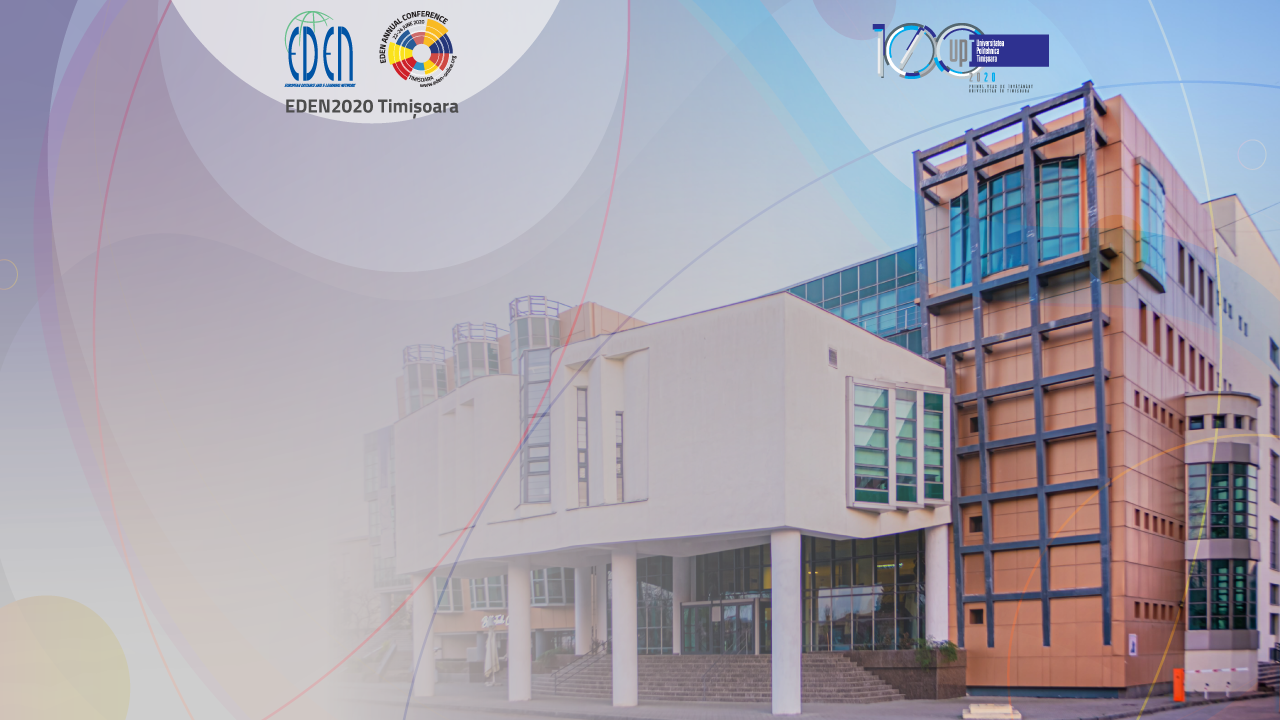
See who the keynote speakers at EDEN 2020 are
The 29th edition of EDEN Annual Conference – Human and artificial intelligence for the society of the future. Stimulating digital education for the next generation of students STE (A) M brings to Timișoara, virtually, between June 22-24, 8 world-class speakers, which offer a series of presentations on cutting-edge topics in open education, artificial intelligence in education and European practices and policies that support digital education.
Find out who I am below Martin Dougiamas, prof. Daniela Rus, Denise Whitelock, George Dimitrov, Demetrios Sampson, Prof. Jesus Apothecary, Anthony F. Camilleri and Dr. Diana Andone - keynote speakers for EDEN 2020:
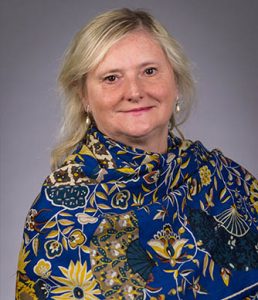 Prof. Denise Whitelock is the interim director of the Institute of Educational Technology at Open University, UK. He is a professor of technology-enhanced education and has over twenty-five years of experience in the field of artificial intelligence for the design, research and evaluation of online and computer learning in higher education. He recently led the UK's contribution to the Electronic Assessment System for Adaptation of Learning Confidence (TeSLA). The overall objective of the TeSLA project was to define and develop an electronic assessment system, which ensures the authentication and authority of learners in online and mixed learning environments, while avoiding the physical time and space limits imposed by a face-to-face examination. He is currently the editor of: Open Learning: The Journal of Open, Distance and Electronic Education. Her work has received international recognition by organizing visits to the departments of the Autonomous Universities, Barcelona and the British University of Dubai.
Prof. Denise Whitelock is the interim director of the Institute of Educational Technology at Open University, UK. He is a professor of technology-enhanced education and has over twenty-five years of experience in the field of artificial intelligence for the design, research and evaluation of online and computer learning in higher education. He recently led the UK's contribution to the Electronic Assessment System for Adaptation of Learning Confidence (TeSLA). The overall objective of the TeSLA project was to define and develop an electronic assessment system, which ensures the authentication and authority of learners in online and mixed learning environments, while avoiding the physical time and space limits imposed by a face-to-face examination. He is currently the editor of: Open Learning: The Journal of Open, Distance and Electronic Education. Her work has received international recognition by organizing visits to the departments of the Autonomous Universities, Barcelona and the British University of Dubai.
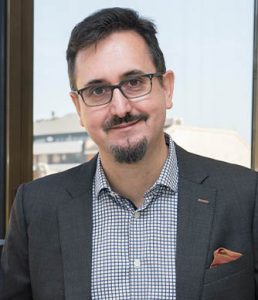
Martin Dougiamas is the founder and CEO of the Moodle open-source software project, launched in 1999. He continues to lead and grow the company with the support of 80 employees worldwide and two major offices in Perth, Australia and Barcelona, Spain. Moodle LMS (Learning Management System) is the best known Moodle product, which allows educators to create a private online space with collaborative learning tools for primary education, high school education, higher education and jobs. First launched in 2001, LMS Moodle is now used in every country in the world by an active community of hundreds of millions of users and is a key infrastructure for over 60%s in all higher education institutions around the world.
Moodle LMS is just one of a full range of open products, including Moodle Apps (for offline and mobile use), MoodleCloud (a SaaS hosting platform with 38,000 Moodle sites), MoodleNet (a new social network for educators) , Moodle Educator Certifications (for teaching digital skills) and Moodle Workplace (a special version of Moodle LMS focused on learning in the workplace).
Martin has a mixed academic background, with multiple postgraduate degrees in computer science and education and two honorary doctorates. He continues to focus on researching how open education technology can best support teaching and learning in open and humane ways, with a strong interest in helping to produce a generation that meets the UN goals of sustainable development.
Recently, Martin started a new initiative, OpenEdTech.global, which aims to encourage open source companies to work collaboratively to provide comprehensive, high-quality, ethical, sustainable educational technology solutions for energy education in the future.
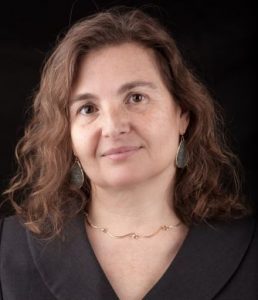 Prof. Daniela Rus is the Andrew (1956) and Erna Viterbi Professor of Electrical Engineering and Computer Science and Director of the Computer Science and Artificial Intelligence Laboratory (CSAIL) at MIT. Rus’s research interests are in robotics, mobile computing, and data science. Rus is a Class of 2002 MacArthur Fellow, a fellow of ACM, AAAI and IEEE, and a member of the National Academy of Engineers, and the American Academy of Arts and Sciences. She earned her PhD in Computer Science from Cornell University. Prior to joining MIT, Rus was a professor in the Computer Science Department at Dartmouth College.
Prof. Daniela Rus is the Andrew (1956) and Erna Viterbi Professor of Electrical Engineering and Computer Science and Director of the Computer Science and Artificial Intelligence Laboratory (CSAIL) at MIT. Rus’s research interests are in robotics, mobile computing, and data science. Rus is a Class of 2002 MacArthur Fellow, a fellow of ACM, AAAI and IEEE, and a member of the National Academy of Engineers, and the American Academy of Arts and Sciences. She earned her PhD in Computer Science from Cornell University. Prior to joining MIT, Rus was a professor in the Computer Science Department at Dartmouth College.
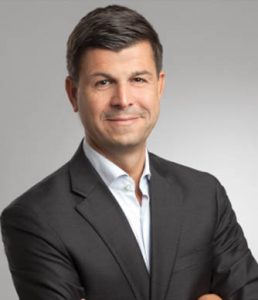 Georgi Dimitrov joined the European Commission in 2008. Between 2009 and 2013 he was involved in various roles in setting up the European Institute of Innovation and Technology (EIT). In 2014-2015, Georgi managed the launch of HEInnovate, a European Commission and OECD initiative that supports entrepreneurial and innovative universities. He then gained experience as a political advisor in senior management. In January 2017, Georgi took on the role of Deputy Head of the Innovation and EIT Unit in DG EAC, where he is responsible for the EIT, digital education, innovation and education, including cooperation between universities and business. Prior to joining the Commission, Georgi worked for a leading multinational telecommunications company in Germany. Prior to that, he worked for a software start-up company in Germany for four years. Georgi studied at the University of Bonn (MA), the University of Erlangen-Nürnberg (PhD) and the Open University UK (through an MBA in Technology Management).
Georgi Dimitrov joined the European Commission in 2008. Between 2009 and 2013 he was involved in various roles in setting up the European Institute of Innovation and Technology (EIT). In 2014-2015, Georgi managed the launch of HEInnovate, a European Commission and OECD initiative that supports entrepreneurial and innovative universities. He then gained experience as a political advisor in senior management. In January 2017, Georgi took on the role of Deputy Head of the Innovation and EIT Unit in DG EAC, where he is responsible for the EIT, digital education, innovation and education, including cooperation between universities and business. Prior to joining the Commission, Georgi worked for a leading multinational telecommunications company in Germany. Prior to that, he worked for a software start-up company in Germany for four years. Georgi studied at the University of Bonn (MA), the University of Erlangen-Nürnberg (PhD) and the Open University UK (through an MBA in Technology Management).
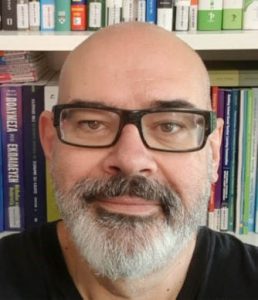 Demetrios Sampson has been engaged in teaching and research in the field of digital learning and learning technologies since 1996. He is the co-author of 350 articles in scientific books, journals and conferences, as well as the editor of 15 books, 35 special issues in academic journals and 40 of international conference papers, with over 6000 citations. He has received 10 times the Award for Best Work at International Conferences on Learning Technologies. He has been a Keynote / Guest Presenter / Lecturer at 90 international / national conferences and / or postgraduate programs. He has been director, principal investigator and / or research consultant in 70 research and innovation projects, with external funding of 16 million euros. He oversaw the honors and successful completion of 155 graduate students. He developed and delivers the first Massively Open Online Course (MOOC) on the use of educational data Analytics by school teachers (Analytics for the Classroom Teacher), offered by the edX platform (a global initiative led by Harvard and MIT), which has attracted more than 16,000 participants from 160 countries around the world since October 2016. He currently leads the University-Industry Consortium (Learn2Analyse) which promotes professional development in educational data literacy for online education and training professionals and higher education students. , co-financed by the European Commission (Erasmus + Knowledge Alliance Program). He is the recipient of the IEEE Computer Society Distinguished Service Award (July 2012) and was named a "Golden Core" member of the IEEE Computer Society in recognition of his contribution to learning technologies. He is also a recipient of the Award Nikola Tesla Golden Chain of the International Society of Engineering Pedagogy (IGIP) for “Outstanding international achievements in the field of Engineering Pedagogy” (September 2018).
Demetrios Sampson has been engaged in teaching and research in the field of digital learning and learning technologies since 1996. He is the co-author of 350 articles in scientific books, journals and conferences, as well as the editor of 15 books, 35 special issues in academic journals and 40 of international conference papers, with over 6000 citations. He has received 10 times the Award for Best Work at International Conferences on Learning Technologies. He has been a Keynote / Guest Presenter / Lecturer at 90 international / national conferences and / or postgraduate programs. He has been director, principal investigator and / or research consultant in 70 research and innovation projects, with external funding of 16 million euros. He oversaw the honors and successful completion of 155 graduate students. He developed and delivers the first Massively Open Online Course (MOOC) on the use of educational data Analytics by school teachers (Analytics for the Classroom Teacher), offered by the edX platform (a global initiative led by Harvard and MIT), which has attracted more than 16,000 participants from 160 countries around the world since October 2016. He currently leads the University-Industry Consortium (Learn2Analyse) which promotes professional development in educational data literacy for online education and training professionals and higher education students. , co-financed by the European Commission (Erasmus + Knowledge Alliance Program). He is the recipient of the IEEE Computer Society Distinguished Service Award (July 2012) and was named a "Golden Core" member of the IEEE Computer Society in recognition of his contribution to learning technologies. He is also a recipient of the Award Nikola Tesla Golden Chain of the International Society of Engineering Pedagogy (IGIP) for “Outstanding international achievements in the field of Engineering Pedagogy” (September 2018).
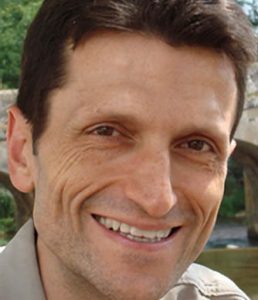 Jesus G. Apothecary has held several positions at UNED in connection with the use of IT in education. He is currently a teacher at the School of Computer Science. He is the head of the aDeNu research group, scientific coordinator in European and national projects, president of CORE conferences and organizer of the series of workshops on modeling and user accessibility. He is also an expert advisor at the UNED Center for Supporting Students with Disabilities and at the Department of Corporate Social Responsibility, UNED and scientific president of Red ALTER-NATIVA. He is the author of over 200 research articles and has participated in 26 funded research and development projects.
Jesus G. Apothecary has held several positions at UNED in connection with the use of IT in education. He is currently a teacher at the School of Computer Science. He is the head of the aDeNu research group, scientific coordinator in European and national projects, president of CORE conferences and organizer of the series of workshops on modeling and user accessibility. He is also an expert advisor at the UNED Center for Supporting Students with Disabilities and at the Department of Corporate Social Responsibility, UNED and scientific president of Red ALTER-NATIVA. He is the author of over 200 research articles and has participated in 26 funded research and development projects.
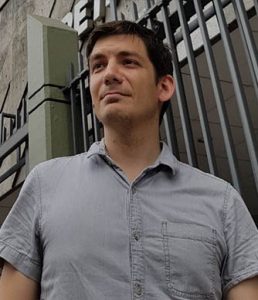 His experience Anthony F. Camilleri refers to the quality assurance processes and the transfer of research knowledge. As part of quality assurance, he provided training on review techniques by quality assurance agencies in Europe and contributed to the UNIQUe and ECBCheck guidelines on quality assurance in e-learning. In terms of knowledge transfer, he collaborated with several associations to better describe the results of research through communication channels, including improved and more targeted web presence, better manipulation of social networks and the production of final publications, including the latest OERTest and EQUNET. It has also developed a methodology to improve the measurement of the impact of dissemination and exploitation activities in EU projects. Mr Camilleri was previously employed as Quality Services Manager for EFQUEL, where he was responsible for coordinating OER-related projects, including OERTest and VMPass.
His experience Anthony F. Camilleri refers to the quality assurance processes and the transfer of research knowledge. As part of quality assurance, he provided training on review techniques by quality assurance agencies in Europe and contributed to the UNIQUe and ECBCheck guidelines on quality assurance in e-learning. In terms of knowledge transfer, he collaborated with several associations to better describe the results of research through communication channels, including improved and more targeted web presence, better manipulation of social networks and the production of final publications, including the latest OERTest and EQUNET. It has also developed a methodology to improve the measurement of the impact of dissemination and exploitation activities in EU projects. Mr Camilleri was previously employed as Quality Services Manager for EFQUEL, where he was responsible for coordinating OER-related projects, including OERTest and VMPass.
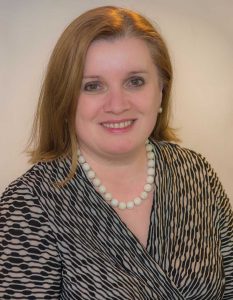 Diana Andone is the director of the e-Learning Center, Politehnica University of Timisoara, with responsibilities in planning and implementing distance learning and integrating the use of online educational technologies for all forms of education, through the Virtual Campus of UPT - CVUPT. Dr. Andone is a lecturer in multimedia and web technologies, with an intense research activity at international level through various European-funded projects and multiple publications (with over 17 books, 80 scientific papers, 11 Best paper Awards). Passionate about the use of technologies in everyday life, Diana promotes the use of open resources OER and MOOCs, developing UniCampus - online courses in Romania. Dr. Andone is strongly involved in the activity of the scientific community through various management positions of international associations EDEN (Vice President), IEEE Romania, IEEE CS TCLT, but also by supporting the activity of the regional community of start-ups and innovation, cultural and social responsability.
Diana Andone is the director of the e-Learning Center, Politehnica University of Timisoara, with responsibilities in planning and implementing distance learning and integrating the use of online educational technologies for all forms of education, through the Virtual Campus of UPT - CVUPT. Dr. Andone is a lecturer in multimedia and web technologies, with an intense research activity at international level through various European-funded projects and multiple publications (with over 17 books, 80 scientific papers, 11 Best paper Awards). Passionate about the use of technologies in everyday life, Diana promotes the use of open resources OER and MOOCs, developing UniCampus - online courses in Romania. Dr. Andone is strongly involved in the activity of the scientific community through various management positions of international associations EDEN (Vice President), IEEE Romania, IEEE CS TCLT, but also by supporting the activity of the regional community of start-ups and innovation, cultural and social responsability.